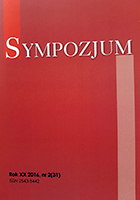Uwolnienie penitentów z kar kościelnych w zakresie wewnętrznym sakramentalnym
Exoneration of penitents from the Church’ penalties in the internal sacramental range
Author(s): Marek StokłosaSubject(s): Canon Law / Church Law
Published by: Wyższe Seminarium Misyjne Księży Sercanów
Keywords: crime; criminal sanctions; ecclesiastical penalty; power of punishment
Summary/Abstract: In the sacrament of reconciliation a penitent through the service of an authorized priest receives the forgiveness of sins through the mercy of God and consequently is reconciled with the Church. One of the fundamental elements of this sacrament is confession of sins in the presence of an authorized priest. Minister of this sacrament, a priest, needs to be delegated to administer this sacrament through the proper licensing. It is given through the power of the law itself or by the attachment to the office or alternatively by the designated church power. In the individual and integral confession penitent could confess the grave sin to the authorized priest which in the Church’ legislation has been defined as offense. In that situation not every priest who is able to listen to confession will have the capacity to give absolution due to the gravity of that sin. In order to release the penitent from the incurred censure the minister needs the adequate power which is given by the legislator in CIC/83 or by the competent power. The power of the confessor is subjected to some restrictions because he is unable give absolution from the Church’ punishments in all cases and release the penitent from all the sins committed. The source of these restrictions, is among others, the division in the Church’ punishments between censures and expiatory punishment and between punishments latae sententiae and ferendae sententiae as well as eventual declaration of the punishment latae sententiae. Moreover, another source of the restrictions applicable to the power of a confessor is the reservation made by the Holy See which applies to some excommunications latae sententiae. The common law this kind of power, with some limits, allocates to the following ministers of that sacrament: 1) bishop; 2) the ordinary; 3) canon penitentiary; 4) a chaplain of a hospital, prison or a sea trip; 5) any confessor in an emergency situation (casus urgens). Additionally the permission to give absolution in some limited range of internal sacramental punishments might be given by the Holy See and by the competent ordinary.
Journal: Sympozjum
- Issue Year: 31/2016
- Issue No: 2
- Page Range: 97-120
- Page Count: 24
- Language: Polish

